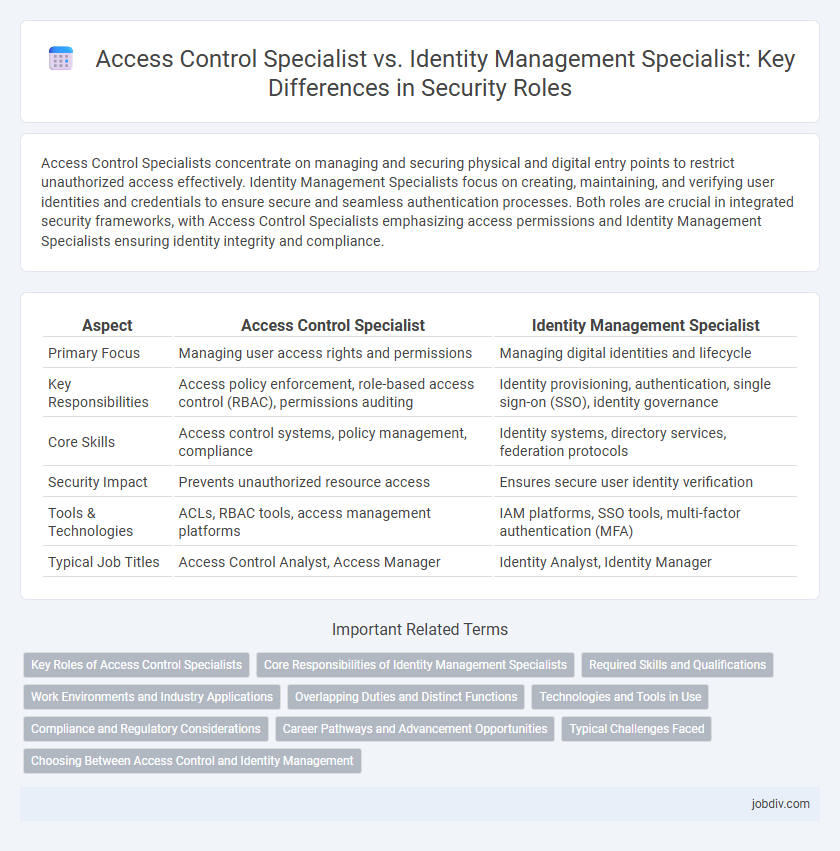Access Control Specialists concentrate on managing and securing physical and digital entry points to restrict unauthorized access effectively. Identity Management Specialists focus on creating, maintaining, and verifying user identities and credentials to ensure secure and seamless authentication processes. Both roles are crucial in integrated security frameworks, with Access Control Specialists emphasizing access permissions and Identity Management Specialists ensuring identity integrity and compliance.
Table of Comparison
| Aspect | Access Control Specialist | Identity Management Specialist |
|---|---|---|
| Primary Focus | Managing user access rights and permissions | Managing digital identities and lifecycle |
| Key Responsibilities | Access policy enforcement, role-based access control (RBAC), permissions auditing | Identity provisioning, authentication, single sign-on (SSO), identity governance |
| Core Skills | Access control systems, policy management, compliance | Identity systems, directory services, federation protocols |
| Security Impact | Prevents unauthorized resource access | Ensures secure user identity verification |
| Tools & Technologies | ACLs, RBAC tools, access management platforms | IAM platforms, SSO tools, multi-factor authentication (MFA) |
| Typical Job Titles | Access Control Analyst, Access Manager | Identity Analyst, Identity Manager |
Key Roles of Access Control Specialists
Access Control Specialists design and implement systems that regulate user permissions and physical or digital access to resources, ensuring strict adherence to security policies. They conduct regular audits, monitor access logs, and collaborate with IT teams to prevent unauthorized entry and potential security breaches. By managing authentication protocols and maintaining access control lists, these specialists play a crucial role in safeguarding organizational assets.
Core Responsibilities of Identity Management Specialists
Identity Management Specialists focus on designing, implementing, and maintaining systems that ensure accurate user identification and authentication across an organization. They manage user lifecycle processes, including provisioning, de-provisioning, and access rights assignment to enforce least privilege and compliance requirements. Core responsibilities include integrating identity governance frameworks, monitoring identity-related risks, and ensuring seamless interoperability between identity management solutions and enterprise security infrastructure.
Required Skills and Qualifications
Access Control Specialists require expertise in physical and logical access systems, familiarity with multi-factor authentication, and experience with access provisioning and de-provisioning processes. Identity Management Specialists must possess strong knowledge of identity lifecycle management, single sign-on (SSO) technologies, and directory services like LDAP and Active Directory. Both roles demand proficiency in security protocols, compliance standards such as GDPR and HIPAA, and advanced troubleshooting skills.
Work Environments and Industry Applications
Access Control Specialists primarily operate in environments requiring physical and digital security integration, such as government facilities, healthcare institutions, and corporate offices, focusing on managing entry points and monitoring access permissions. Identity Management Specialists specialize in digital identity verification and access rights across IT infrastructures, often found in technology firms, financial institutions, and cloud service providers, where secure authentication and user lifecycle management are critical. Both roles ensure protection against unauthorized access but apply distinct strategies tailored to their specific work environments and industry demands.
Overlapping Duties and Distinct Functions
Access Control Specialists focus on defining and enforcing policies that regulate user permissions to secure physical and digital resources, emphasizing access rights and authentication mechanisms. Identity Management Specialists manage user identities through lifecycle processes including provisioning, de-provisioning, and synchronization across systems, ensuring accurate identity validation and compliance. While both roles overlap in implementing authentication and authorization protocols, Access Control Specialists concentrate on permission enforcement, whereas Identity Management Specialists prioritize identity data integrity and management across platforms.
Technologies and Tools in Use
Access Control Specialists primarily utilize technologies such as Role-Based Access Control (RBAC), Attribute-Based Access Control (ABAC), and physical security systems including biometric scanners and smart card readers to manage user permissions and secure entry points. Identity Management Specialists focus on tools like Identity and Access Management (IAM) platforms, Single Sign-On (SSO), Multi-Factor Authentication (MFA), and directory services such as Microsoft Active Directory to ensure accurate user identity verification and lifecycle management. Both roles leverage security information and event management (SIEM) systems for monitoring and auditing access activities to enhance organizational security posture.
Compliance and Regulatory Considerations
Access Control Specialists primarily ensure compliance by implementing and monitoring access policies that align with regulatory frameworks such as HIPAA, GDPR, and SOX. Identity Management Specialists focus on managing user identities and credentials to meet audit requirements and enforce least privilege access, crucial for regulations like PCI DSS and NIST standards. Both roles collaborate to maintain robust security postures by continuously updating controls and verifying adherence to evolving legal mandates.
Career Pathways and Advancement Opportunities
Access Control Specialists focus on implementing and managing physical and logical access systems, advancing to roles such as Security Manager or Access Control Administrator with expertise in surveillance and entry protocols. Identity Management Specialists specialize in digital identity lifecycle management, progressing toward positions like Identity and Access Management (IAM) Architect or Security Consultant, emphasizing policy development and authentication technologies. Both career paths offer advancement through certifications such as CISSP, CISM, or specialized IAM credentials, with opportunities extending to leadership roles in cybersecurity strategy and governance.
Typical Challenges Faced
Access Control Specialists often face challenges related to enforcing precise permission levels across diverse systems, tackling issues like unauthorized access and privilege escalation. Identity Management Specialists confront difficulties in maintaining accurate user identity data, ensuring seamless integration with multiple authentication platforms, and addressing identity lifecycle complexities. Both roles require constant adaptation to evolving cyber threats and compliance requirements to safeguard organizational assets effectively.
Choosing Between Access Control and Identity Management
Access Control Specialists focus on defining and enforcing permissions to ensure authorized users access specific resources, while Identity Management Specialists handle user identity verification and lifecycle management across systems. Choosing between the two depends on whether an organization prioritizes granular resource access policies or comprehensive identity verification and administration. Evaluating business needs for security architecture, compliance requirements, and scalability informs the optimal role for enhancing organizational security postures.
Access Control Specialist vs Identity Management Specialist Infographic

 jobdiv.com
jobdiv.com